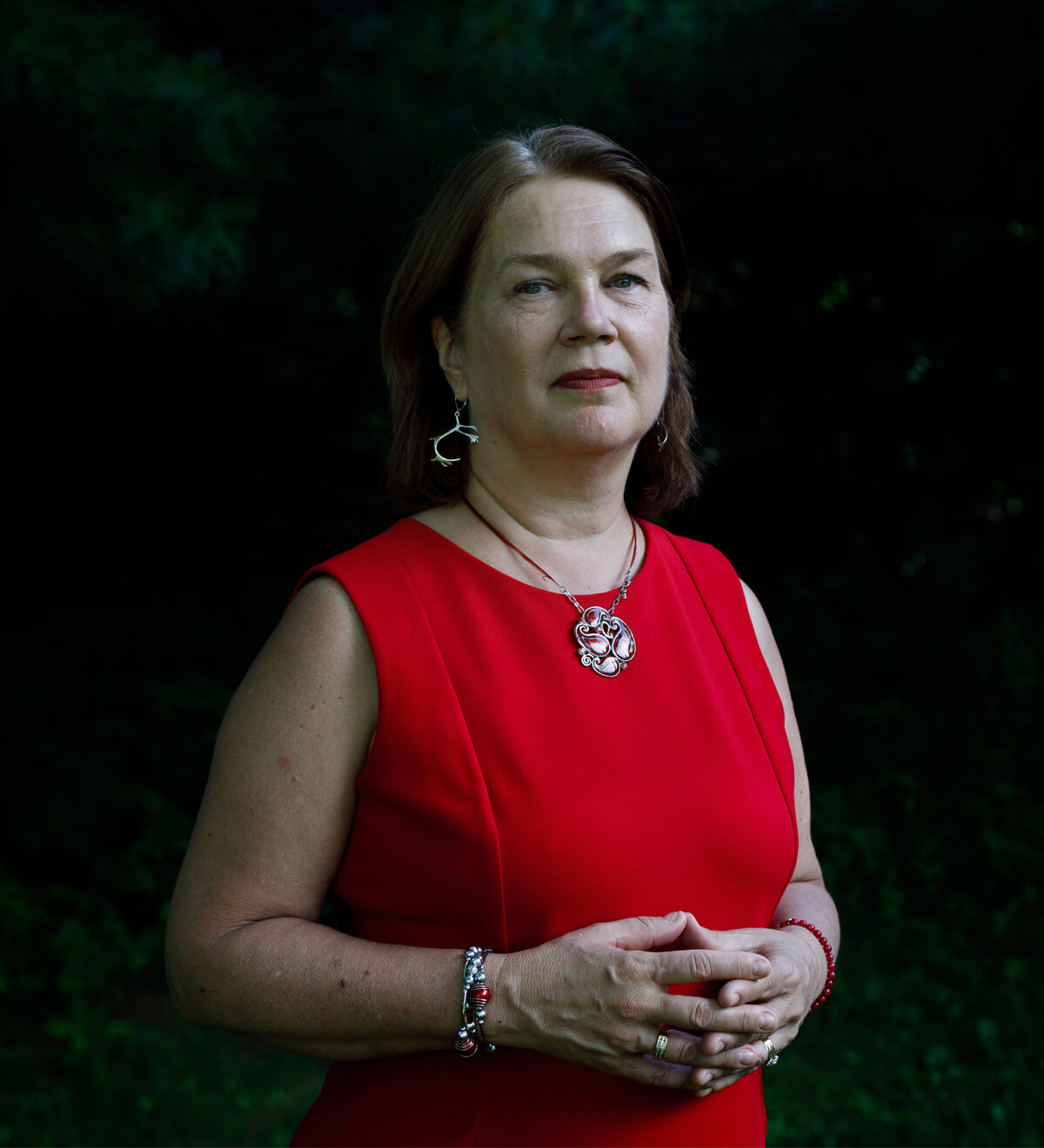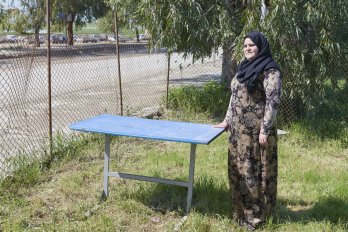this past canada day, Jane Philpott—member of Parliament for Markham-Stouffville, former minister of health, ex–minister of Indigenous services, ex–Treasury Board president, unlikely renegade, and lover of four-part harmony—stood in the clubhouse at Swan Lake Village, a gated retirement community in Markham, Ontario, and led a couple hundred tipsy seniors in a rendition of “O Canada.” This is sort of a tradition for Philpott. When she visited the clubhouse a previous July, the pre-recorded version of the anthem they’d planned to use didn’t work, so Philpott gamely offered to step in. She’s a soft-spoken person, generally, but can be loud when she needs to be. She’s also got pretty good pipes—prior to becoming a politician, she led the congregation’s singing at her church, the Community Mennonite Church in Stouffville, once a month. This year, Swan Lake skipped the recorded middleman and just asked Philpott directly whether she’d lead them again. After a quick gulp of white wine, she obliged.
It was her sixth stop and fourth singing of the anthem on her tour of her riding that day, which had begun with an early morning citizenship ceremony at Markham Civic Centre and would wind down ten hours later with a flag raising at Milne Dam Conservation Park. In between, there would be several community parties and many more imbibing seniors. Along with her constituency director, Julie Weiss, and her twenty-four-year-old son, David Philpott, she would hand out hundreds of Canadian flags and pins and apply an untold number of maple-leaf temporary tattoos. It was alternately enervating and energizing, tedious and thrilling.
This was, more or less, the same itinerary that Philpott has followed every Canada Day since she was first elected to Parliament in 2015. The only wrinkle—and it was a wrinkle that made itself felt in the majority of conversations that day—was that Philpott was no longer a member of the Liberal Party she’d represented those previous three and a half years. Booted out of caucus by Prime Minister Justin Trudeau after she protested his handling of the SNC-Lavalin scandal, she was now an independent MP.
Canada has had very few independent MPs—about 100, in fact, since Confederation. Before Philpott and her friend and colleague Jody Wilson-Raybould were kicked out of the Liberal caucus in the dramatic resolution to the most dramatic scandal the current government has weathered, the country had rarely had independent MPs of such accomplishment and renown. When both Philpott and Wilson-Raybould announced in May that they would seek reelection as independents, they had gone rogue, at least in the eyes of vocal Liberal supporters, but they also began a radical experiment that Philpott hopes could begin to reshape our political landscape.
Technically, Philpott wasn’t electioneering at all those Canada Day events—she was attending as an elected representative of the riding—but, throughout the day, people kept asking about her campaign and the complicated, divisive turn of events that led up to it. These conversations, or at least the ones I eavesdropped on, all had a similar, I’m-with-her tenor: people told Philpott they were proud of her, that they admired her principled stand, that they were disappointed in the government. They thanked her repeatedly—for inspiring them to run for city council, for helping out with the passport office. “I work miracles,” she joked.
Philpott remained warm, relaxed; she dropped her g’s on occasion, appearing more folksy when she did. At the Ballantrae Golf and Country Club recreation centre, which was hosting its own boozy party, a supporter approached her and quietly told her it was a sad day when someone of her integrity and capability was treated so shabbily. Philpott smiled gratefully. “I’m not going to let them chase me away,” she said.
A year ago, Philpott, who is fifty-eight, was the minister of Indigenous services and one of the most respected members of Trudeau’s cabinet. As she had done in her previous portfolio, the Ministry of Health, Philpott had proven herself an uncommonly effective politician. She also engaged with Indigenous communities more directly than many of her predecessors had: she was the first minister, in anyone’s memory, to meet with the band council and treaty chief of the Woodland Cree First Nation on their territory. Grand Chief Alvin Fiddler, of the Nishnawbe Aski Nation in northern Ontario, describes her as “respectful and collaborative and practical. . . . She understood the magnitude of the challenges and inequities that face our communities.” He still recalled, with some wonder, that she had kept a chart on her desk, updated weekly, of the boil-water advisories across the country. It was a remark that illustrated Philpott’s evidence-based decision making and also how low the bar remains when it comes to such issues—a tracking system like that does not seem like it should be noteworthy.
By all accounts, the theme of Philpott’s life has been public service. Her parents, Wallace and Audrey Little, were, respectively, a Presbyterian minister and a schoolteacher, and they taught Philpott and her three sisters (Philpott’s the eldest) early on about privilege and finding satisfaction in helping others. Philpott was drawn to the sciences and had dreams of becoming a civil engineer, but also liked working with people—family medicine perfectly blended the two. She completed medical school at Western in 1984 and then her family-medicine training in Ottawa, where she met her husband, Pep Philpott, another minister’s kid. (He is now a producer at cbc Radio.) They had a daughter, Emily, and another, Bethany, and then joined a mission in rural Niger, where Philpott practised medicine and helped develop a training program for village health workers.
She knew that the world was inequitable, of course, but conditions in Niger reminded her of this vividly. Unlike the villagers that she worked with, she hadn’t grown up pounding millet every morning so she could have her breakfast. She had learned to read and write. “I realized, first of all, that I should do something with those unearned advantages,” Philpott says. “But, also, that it wasn’t fair. Why did I get to be the lucky one? So I tried to figure out what I could do to make the world a little bit fairer.”
In March 1991, when Emily was two and a half years old and Bethany still a baby, both contracted meningococcus, a bacterial infection readily treatable in Canada but frequently fatal in much of the world. Bethany survived, but Emily didn’t. A couple of months after the family had evacuated to Canada so that Bethany could get further treatment, they returned. The same week that Emily had passed away, dozens of other children had also died of the same illness. “We realized that, in a sense, Emily’s death would have been in vain if we just walked away,” Philpott says.
The Philpotts came back to Canada in 1998, settling in Stouffville, about a forty-five-minute drive northeast of Toronto, where Philpott became a family doctor and health administrator. (By then, she and Pep had had three more children: two sons, Jacob and David, and another daughter, Lydia.) Medicine, though, wasn’t enough for her. In 2004, she helped launch Give a Day, a campaign that challenges Canadians to donate a day’s pay to help people in sub-Saharan Africa who are dealing with HIV/AIDS. In 2012, she got her master’s in public health. She helped start a family-medicine training program in Ethiopia. Then, with the encouragement of former prime minister Paul Martin, she decided to run for office. In 2015, in the newly formed riding of Markham-Stouffville, she beat area incumbent Tory, Paul Calandra, by a comfortable margin.
Philpott was unusually active for a first-term MP. In the first years of her mandate as minister of health, she worked with John McCallum, then minister of immigration, refugees, and citizenship, to bring more than 25,000 Syrian refugees to the country in three months. With Wilson-Raybould, then minister of justice, she created new medical-assistance-in-dying legislation. And, in an effort to combat the opioid crisis, she overturned a ban on prescription heroin while also working on the government’s cannabis-legalization bill.
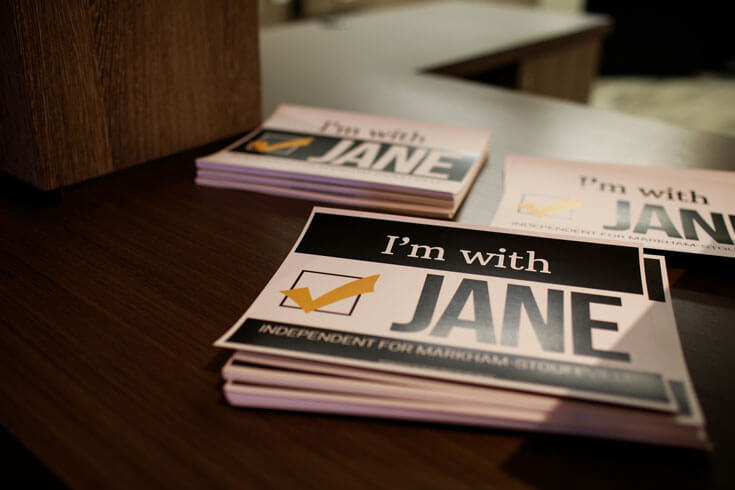
Medicine turned out to be very good training for politics. It had taught her how to listen, how to collaborate, how to diagnose and solve problems. But politics was also unlike medicine in ways that she didn’t like: it was too often adversarial, and she loathed the party loyalty that required her to completely disregard the contributions or wisdom of her political opponents. As the government’s mandate went on, Philpott was increasingly told she couldn’t make certain decisions without the approval of the Prime Minister’s Office (PMO). She never felt that Trudeau really understood her or why she was making the choices she was making.
Philpott and Wilson-Raybould had grown close, and when Parliament resumed last fall, they had decided to get a bit more exercise together. They began meeting early in the morning, taking a rapid, five-kilometre walk around the parliamentary precinct to Gatineau and back. Soon, Wilson-Raybould was telling Philpott about the pressure she was feeling from the PMO around SNC-Lavalin and the remediation agreement that would allow the Quebec company to avoid criminal prosecution. Philpott, citing cabinet confidentiality, won’t share the details of their conversations but says she mainly just listened.
The subsequent twists and turns of the saga have been thoroughly documented, but by March, both ministers had lost confidence in the government and resigned from cabinet. In early April, Trudeau expelled them from caucus. The reaction, both within government and without, was polarizing. For some, Philpott and Wilson-Raybould were a political Thelma and Louise, courageously sacrificing everything to change an insular, calcified system. For others, they were naive, too idealistic, inexperienced in the realpolitik of government. Or worse: traitorous, self-interested, sanctimonious, dangerous—that they wanted Trudeau out and had tried to inflict the maximum damage possible.
The greatest fear, for Liberal supporters, was that the scandal had opened up the party to a serious challenge from the Conservatives in the fall election. “I saw zero foresight,” one of Philpott’s constituents told me. “If you think you’re going to change the way politics are done, you’re cuckoo for Cocoa Puffs.”
For Philpott, last winter was a disorienting, disappointing, and hurtful season. She felt like she was living in a reality-TV show, with herself as one of its reluctant stars. In the end, though, she felt no regret. She had made the right decision, she says, the only decision she could, in good conscience, make: “I had a couple of women, constituents, come to my office and say, ‘We fought so hard to get a seat around the table, and you got there and you gave it away.’ It kind of stunned me. My answer to them was, ‘We didn’t fight hard to get a seat at the table so that we [could] do things the way they’ve always been done and let the boys still run things the way the boys have been running things.’”
In toronto, Dave Meslin—an activist known in political circles for his creative, unorthodox campaigns around voting reform and public space—watched with glee as Philpott and Wilson-Raybould asserted themselves to the prime minister. He was just gearing up for the publication of his first book, Teardown: Rebuilding Democracy from the Ground Up, in which he argues that one of the many problems with our federal government is the centralization of power in the PMO. MPs, who are elected to represent their constituents, are too often muzzled in the name of party loyalty, blindly obedient to party leaders and prime ministers. “How can any citizen or party member feel empowered and engaged if our own MPs feel like trained seals?” Meslin writes. Now, here were two extremely high-profile cabinet ministers seeming to prove exactly his point. “Trudeau recruited some really strong, bold, confident women,” Meslin says. “Good for him. But I don’t think he fully thought through what that might mean in terms of not being able to operate in the ways that leaders usually operate.”
About a week after Philpott was kicked out of caucus, Meslin sent her a direct message on Twitter and asked if they could talk; soon after that, they met for lunch in Stouffville. Philpott was already contemplating her next move. She and her staff had been carefully tracking constituents’ responses to the fallout from SNC-Lavalin, and given how positive, mostly, that feedback had been, she had made up her mind to run again. The only question was for whom.
“I never felt an overriding sense of ideology from Jane,” the humanitarian and former politician Stephen Lewis says (the two worked together on the Give a Day campaign), and, indeed, it can be tricky to pinpoint Philpott’s precise political world view. Progressive Christian is probably the best descriptor, but she also, she says, “leans on the fiscally conservative side” and grew up feeling PC governments had done some “really great things”—specifically, NAFTA and Brian Mulroney’s pushing for the release of Nelson Mandela. She was, and is, to the left of the Trudeau Liberals on many key issues: she’s in favour of decriminalizing all drugs, wants proportional representation, and, while refusing to break cabinet confidentiality, suggested to me that she was opposed to the Trans Mountain pipeline expansion. Climate change is one of her chief priorities, but she also insists, like many other progressives do, that climate solutions are impossible without also addressing Indigenous issues.
No established party appealed to her sufficiently, though the Greens came closest. Elizabeth May courted both her and Wilson-Raybould intensely, but in the end, Philpott says, “It was a combination of not being convinced 100 percent that I’m Green through and through, not feeling like I was ready to wrap myself in another colour, and also developing a sort of vision of what the role of an independent could be.”
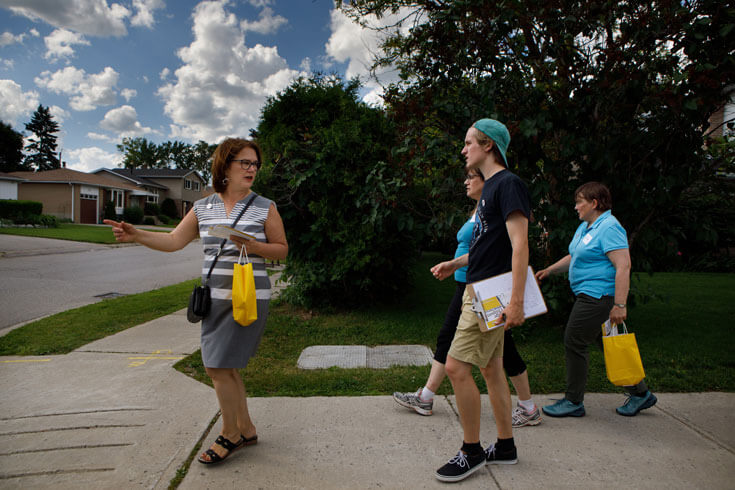
Meslin had been thinking about that same question. In his book, which Philpott read after they met, he doesn’t disguise his disdain for political parties in this country and the first-past-the-post voting system by which representatives are elected. Nor does he have patience for the political whiplash that generally follows a change in government, when a predecessor’s work is undone often only because a new government is of a different political stripe. “Rather than creating spaces for political community,” Meslin writes, “our parties are feeding apathy and cynicism.”
Philpott echoes this: “I heard from a lot of people that they’re just really tired of these parties and the amount of power they have. They’ve taken a role beyond what they were intended for—as an organizational tool—and become a power-wielding tool.” An independent candidate, on the other hand, especially someone with Philpott’s profile and experience navigating government, could, at the very least, disrupt the normal political order. The presence of an independent could allow voters to choose a candidate because of their particular policies and personality, not a party’s. It could make electoral reform a more pressing issue.
Around the same time Meslin got in touch, Philpott was also talking to Ian Capstick. Capstick had once worked for Warren Kinsella in the Liberal war room and later became an NDP spokesperson and a fixture on the cbc’s Power & Politics. He had recently become disgusted with how partisan politics, in his view, poisoned Ottawa and undermined his own mental health, and he quit his gig as a talking head. “I don’t think the way we engage in politics in Canada is as fair, as just, as honourable, or as responsible as it could be,” Capstick says. He was thrilled that Philpott was considering an independent run and felt that there had never been a better time for it. Independent candidates, he says, are having a moment—in Ireland and the US as well as here at home.
Capstick and Meslin, with whom he’s friendly, both dream of a Parliament that eventually includes a kind of party of independents, in which representatives are committed to their constituents rather than to a leader, to a process of collaborative decision making rather than to a preordained platform. (Both Meslin and Capstick have also informally advised Wilson-Raybould.) For now, it’s a somewhat quixotic hope, Meslin and Capstick admit, and, anyway, first Philpott and Wilson-Raybould need to get elected. Even if that happens, as independent MPs, their roles will likely be more limited than when they were members of a major party—and certainly more limited than when they were cabinet ministers—though they will be able to help connect their constituents to the right people in government and try to shape policy through the media.
A minority Liberal government, one in which the Greens and independents hold the balance of power, would be ideal, says Capstick, but he is optimistic that even just Philpott and Wilson-Raybould’s reelection would be inspiring: “It’s not a magic pill that’s going to instantly fix Ottawa. But it might be part of a solution that says, ‘This country’s federal government can be better for more people.’”
Many voters—Philpott’s constituents included—and political pundits find such talk far-fetched: well intentioned but fundamentally inconceivable. But it may not be as fanciful as it sounds. Chris Cochrane, a professor of political science at the University of Toronto, concurs. “A lot of people want this independent spirit,” he says. “Our government was not designed to be run by officials in the Prime Minister’s Office, and that’s the system of government we have now. And unless more politicians on all sides, in all parties, are willing to do the kinds of things that Philpott and Wilson-Raybould did, we’re going to have the same system in every majority setting from now on.”
At the end of May, Philpott and Wilson-Raybould held separate press conferences and announced that they were going to run for reelection as independents. Unfettered by the Liberal Party, they could do other things a bit differently, set their own policy agenda, and eschew the get-out-the-vote imperative—anathema to Meslin—that governs most election campaigns. Traditionally, candidates and their teams of volunteers spend a lot of time knocking on doors in their ridings. But, rather than talking to voters about the issues, this effort focuses primarily on data collection, a way for the party to identify who will vote for their candidate.
On election day, volunteers similarly spend all their time making sure those particular voters go to the polls, deliberately ignoring residents who might vote for someone else. “It’s an incredibly cynical approach,” Philpott says. “In a way, it’s a voter-suppression scheme.” Philpott and her campaign manager, Jennifer Hess, plan, instead, to do what Meslin calls a “full pull,” knocking on every single door in the riding, talking to everyone who answers, no matter their voting preference. “Previously, we had been told, ‘Don’t bother knocking on doors of people who aren’t citizens or people who can’t vote,’” Hess says. “We’re talking to everyone.”
I met philpott, for our first interview, at her home in Stouffville in late June. She and her husband had recently downsized to a townhouse in a new development a five-minute drive from the centre of town, and it still felt somewhat unlived in—tidy and comfortable but vaguely generic. It nonetheless hummed with domestic activity. The night before had been the campaign’s official kickoff, and a number of family members, in from out of town, still flitted about the house: Philpott’s younger sister Karen, a teacher, and her son Ben; Philpott’s son Jacob; and her mother, Audrey. As Philpott and I spoke in her living room, she sipped black coffee, with Jacob’s cat, a rescue named Nefertiti, sleeping beside her.
Philpott resembles neither the politicians I’ve met nor the family doctors I’ve known. If anything, she seems more like a minister: kind, earnest, and solicitous but with an almost overbearing moral code that is never far from mind (hers or yours). She can be both intimate and detached, and uses the word burden frequently. She likes to quote her parents, who liked to paraphrase Luke 12:48—“To whom much is given, much is expected”—but if anyone expects a lot, it’s Philpott. She expects a lot from herself, from her family, from the prime minister, from the country. When she talks about government, implausibly to contemporary ears, she makes it sound like a calling even more noble than medicine: “Politics is just a way of asking people to make decisions as to who we’re going to be as a country.”
But surely her bruising experience in government must have made her reconsider sticking around? “There was, and there still is, periodically, a little temptation to think, ‘I could just leave office.’ Sometimes this is really hard. I have another career I could go back to. I made more money. I certainly got a lot more respect as a doctor. People love family doctors, and I loved being a family doctor. It would be less stress on my husband and my family. But I really felt—and I don’t want to sound in any way inauthentic here—a kind of responsibility to the people in my riding. . . . I got into politics because I thought I could help even more people than I could help as a doctor. Should I leave because things got harder and more complicated?”
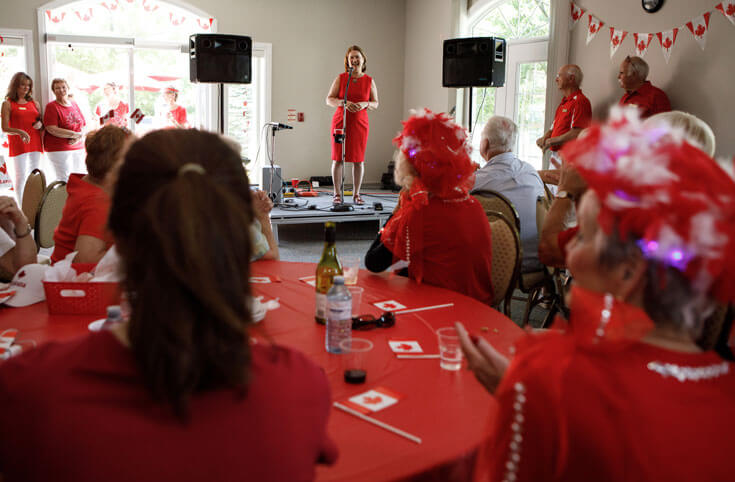
After our interview, I followed Philpott for a couple more hours as, in the hot late afternoon, she canvassed a neighbourhood not too far from downtown Stouffville. It was still early days: the writ was months away from dropping, and her campaign office felt as new as her home. A whiteboard propped up in the middle of the room listed the things that the office needed, which was everything: laptops, coffee makers, Kleenex, a fire extinguisher. Her campaign literature and posters were accented in yellow —one of the few colours not yet claimed by the main parties—and, as she went from door to door, Philpott carried flyers in a small yellow bag.
The neighbourhood was suburban, lower middle class, a jumble of modest, architecturally incoherent bungalows. Philpott moved briskly and with good cheer. She pointed out and praised even the most humble of gardens, then shrugged: “Who has the time?” Many residents were elderly, and Philpott, in a rare display of political calculation, said, “Being a family doctor is a huge help in this town.”
Unlike Canada Day, this wasn’t the Jane Show. At many homes, when Philpott told residents she was running for reelection, they blinked uncomprehendingly for a few moments. She ran into a couple of old friends, supporters, and people who had some connection to her life as a doctor, but she also met indifference and mild hostility. As we approached an older pair, sitting in lawn chairs, sipping cocktails in their driveway, she apologized for interrupting them. One of the two crisply implied she could have just moved on; the other, stone faced, said nothing. Philpott kept going.
Toward the end of the afternoon, she rang the bell at one house, and a Philpott fan answered. Her husband, who had been making dinner, soon came to the door as well. He was similarly enthusiastic about Philpott herself but much less so about her running as an independent. “You’re an honourable person,” he said. “And you can do whatever you want. But what are you going to be able to accomplish?” Philpott seemed slightly taken aback at the cheek of the question, but she had an answer, more or less: “Well, you know me. I’m going to work hard.”
Such apprehension was not uncommon. Another constituent, still angry about Philpott’s resignation, was even blunter: “An independent can’t do anything for their constituents, and that’s what pisses me off. And to invite more people to run as independents is doing a disservice to our democracy at a time when our democracy should not be taken for granted.”
Being an independent may free you of party control, but it also means you lack the familiar apparatus that a party brings: brand recognition, the deep pockets of partisan donors, the comfort of the status quo. It can be lonely. Simply explaining what an independent MP is, and how they can work within the existing party system, can be burdensome. “It can be hard for people to wrap their brains around it,” Hess says. “Friends, family—they’re supportive, but they have questions. I’m still working through them myself, to be honest.”
December 17, 2019: An earlier version of this article stated that Stouffville is northwest of Toronto. In fact, it is northeast of Toronto. The Walrus regrets the error.

